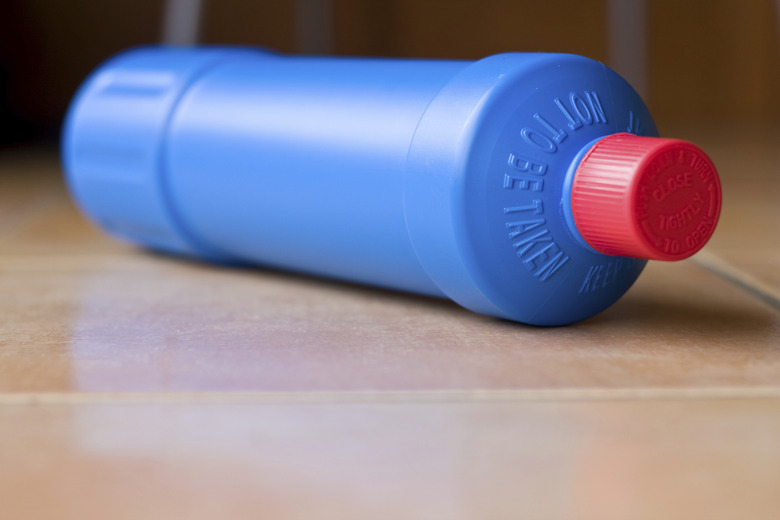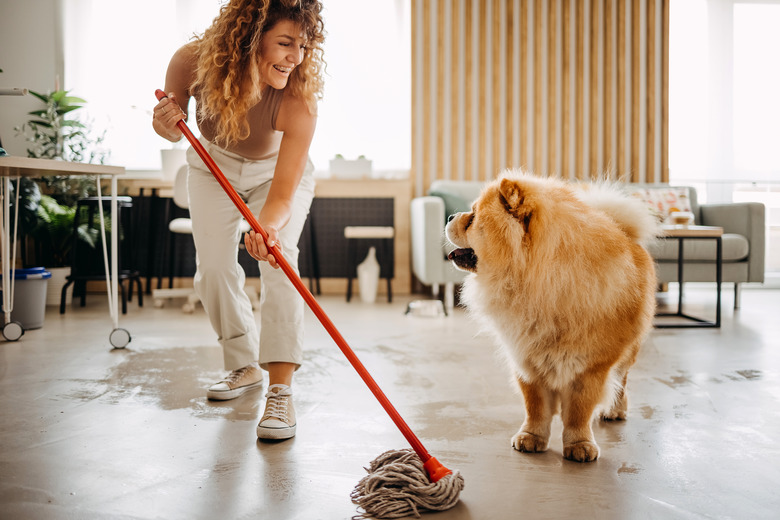Will Bleach Hurt My Dog?
Will Bleach Hurt My Dog?
Yes, exposure to bleach through ingestion, breathing, or direct skin contact is extremely dangerous for dogs. If you use bleach to sanitize your dog's sleeping area or toys, you might want to think twice because it can affect your pet's health. We spoke with Dr. Shagufta Mulla, a veterinarian with a DVM degree from Colorado State University with 20 years of experience as a small animal veterinarian, to learn more. Symptoms of bleach exposure range from mild irritations to internal corrosion depending on how diluted the bleach is and the size of your dog.
Bleach is a popular household sanitizer that is hidden in all kinds of products in your home. Read labels and be aware of all the chemicals you use in your pup's environment. If you have any questions about the toxicity of cleaning products you should use around your dog, contact your veterinarian before using them.
Internal concerns if your dog ate bleach
Internal concerns if your dog ate bleach
If your dog ingests household bleach, it can severely corrode their insides and cause death. Pay attention to symptoms of bleach ingestion:
- drooling
- depression
- lack of appetite
- diarrhea
- problems swallowing due to a sore throat
- painful spots on their belly
- vomiting
The symptoms above are most prevalent in this scenario. "You don't want to force your pup to throw up, but if they are vomiting on their own, that needs to be managed by your veterinarian immediately," says Dr. Mulla. "When the bleach comes back up their esophagus, it could lead to further corrosion of their mouth and throat."
Take your pup to the nearest emergency clinic immediately. Without proper treatment, bleach poisoning can be fatal. "Before offering your dog anything to drink, call your veterinarian to see if you should offer water or milk," says Dr. Mulla.
Additional internal considerations for a dog who ate bleach
Additional internal considerations for a dog who ate bleach
Your dog doesn't have to drink something with bleach for it to be a problem. "The fumes can also be irritating to his eyes," says Dr. Mulla. If your dog inhales large amounts of bleach fumes, they may start coughing, heaving, sneezing, or gagging. The fumes can also irritate a dog's eyes.
With frequent exposure, these fumes can lead to blood and metabolic problems. You can still sanitize your house with properly diluted bleach, but leave your dog outside or take them out for a walk until all surfaces are dry and those fumes are gone.
"Depending on what's being sanitized, for example, a food surface versus a non-food surface, the recommended bleach-to-water ratio varies, so be sure you are using properly diluted bleach," cautions Dr. Mulla. "When you are using bleach and weather permits, have windows open for better ventilation."
Opening windows ensures proper ventilation for you, the other humans in your family, your dog, and any other pets in the home. You can also print out an illustrated list of signs and symptoms of poisoning in pets.
External problems if your dog ate bleach
External problems if your dog ate bleach
Bleach burns in a canine can be dangerous. Bleach can can cause severe skin irritation, creating a painful, burnlike rash. If they get some on their fur, rinse the area under cool running water. Wash the area with a mild dog shampoo, like an oatmeal shampoo, depending on the severity of the exposure.
If it's too red and irritated, just stick to water. Bleach is irritating to your pooch's eyes as well. Their eyes will likely water and swell shut if bleach gets in them. In some cases, bleach can damage the cornea and impact a dog's vision. Seek immediate medical attention even if the spot doesn't seem that bad. Some symptoms might take a little while to surface.
Consider all sources of bleach in your home
Consider all sources of bleach in your home
You might have already thought about securing that big bottle of bleach or box of laundry detergent in a locked cabinet. However, not all sources of bleach are that obvious. Take your toilet bowl, for example. If you have one of those self-cleaners that hangs from the side or a cleaning tablet that drops in the tank, there's likely bleach in your toilet water. If your furry friend drinks from the toilet, they could be exposed to bleach that way. Shower cleaners, disinfectants, pool chemicals, and packages of lightening hair dye can all contain bleach.
Put child safety locks on all of your closets and cabinets that contain chemicals or household cleaners like floor cleaners, drain cleaners, and oven cleaners. Even eco-friendly cleaners without toxic ingredients can be life-threatening if they are consumed by dogs, cats, or children. Keep your toilet lid closed if you use a cleaning agent in it. If you have a chlorine pool, it's safest not to let your dog drink from it. These safety tips can save your pooch's life.
The bottom line
The bottom line
Concentrated bleach, non-concentrated typical household bleach, and color-safe bleach are not safe for dogs. If you think your dog ate bleach or other household cleaning products, call your local emergency veterinarian. If you live in a rural area or some great distance from the nearest 24-hour emergency veterinarian or if you aren't sure whether your pet ate something with toxic chemicals, you can call the ASPCA Animal Poison Control Center or the Pet Poison Helpline at (855) 764-7661.


